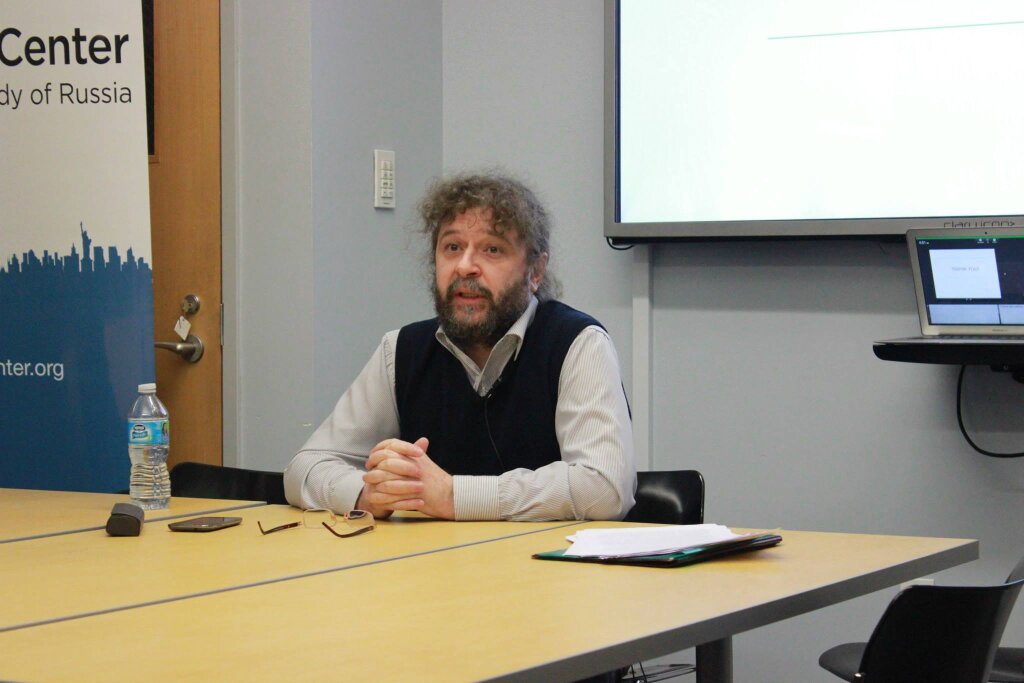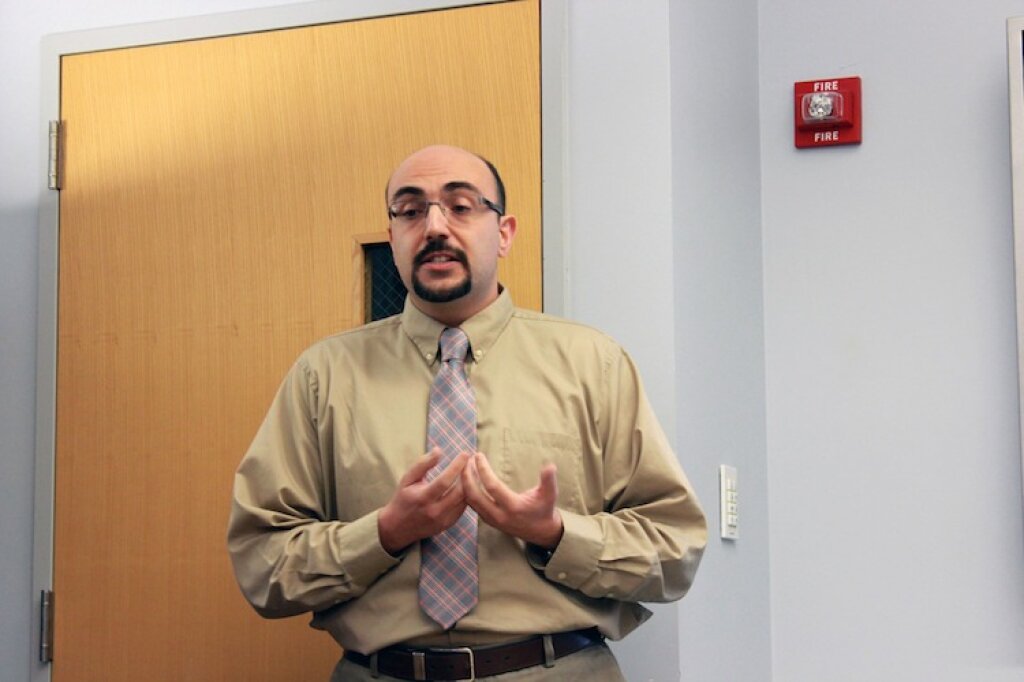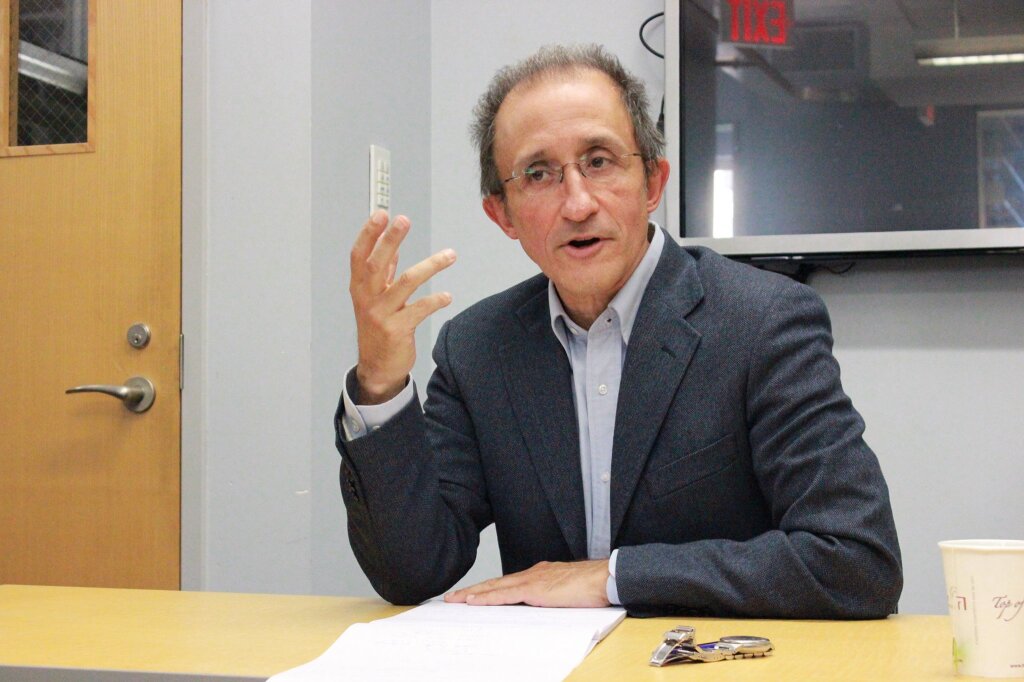Watch the video of the event here
On March 31, 2015, the NYU Jordan Center for the Advanced Study of Russia welcomed Igor Pilshchikov, lead researcher at the Institute for World Culture at Lomonosov Moscow State University and a senior researcher at Tallinn University, to present a paper entitled “The Legacy of Russian Formalism and Contemporary Humanities.” Pilshchikov discussed the lack of methodological unity and a singular paradigm in the Russian Formalist school – a group of literary critics operating from the 1910s to the 1930s – due to the diversity of approaches and ideas formulated by its two circles. One circle was based in St. Petersburg and was known as the OPOYAZ. The second was the Moscow Linguistic Circle (MLC), which set a significant precedent for further 20th century scholarship in linguistics and literary theory, Pilshchikov said. Pilshchikov also noted that the MLC’s legacy is largely underestimated, mainly because unlike the OPOYAZ they hardly published any of their works. It wasn’t until recently that their works were published and closely scrutinized.
Both movements shared some basic ideas but differed over their aims. For instance, they both valued the “how” in literature over the “what.” They also worked on questions of literariness, evolution, genesis, and the position of the practical language and its deformation by form. Both circles also sought to develop the study of literature as an autonomous discipline and a distinct science.
Pilshchikov then discussed key figures of these two movements and their scholarly contributions to each group. The OPOYAZ prominently included Viktor Shklovsky, Boris Eichenbaum and Yurii Tynianov. Pilshchikov spoke about the important distinction introduced by Shklovsky between fabula (story as material) and siujet (plot as construction). He also noted Shklovsky’s famous concept of ostranenie (defamiliarization), “which removes the automatism of perception.” Tynianov developed the distinction between evolution and genesis. Pilshchikov stated that evolution is something intrinsic to literature of national tradition whereas genesis is extrinsic and “implies interaction between literature and other social or cultural practices, or one national tradition and another.”
The MLC prominently included Roman Jakobson (first president of the MLC), Boris Jarcho and Maksim Kenigsberg. Here Pilshchikov presented the MLC and some of its scholars views on the need for a new method or understanding of literature. The main focus of MLC included linguistics, poetics, metrics, and folklore. Philologist Maksim Shapir opposed the OPOYAZ and believed that while OPOYAZ produced mainly journalistic criticism, MLC was developing academic scholarship and revolutionizing methodology. Pilshchikov stated that OPOYAZ based its poetics on the theory of literature while the Moscow circle centered its studies on linguistics.
After the dispersal of OPOYAZ and MLC, the members of these two groups continued their work at two universities. One was the State Institute of the History of Arts in Leningrad and the other was the State Academy of Artistic Sciences in Moscow. Boris Jarcho’s important work “Methodology of Exact Literature Studies” laid out a “large scale plan which aimed at the development of the methodology of literary studies and the study of poetic language using statistical methods.” Jarcho was influenced by theories on biology of Danish botanist and geneticist Whilhelm Johannsen, which in his view contained a high level of precision and could be comparable to the study of literature that he sought to develop. Pilshchikov outlined Jarcho’s methodology, which overall shows the important use of the scientific method.
Key ideas of the MLC were later taken up by prominent scholars such asYuri Lotman and Mikhail Gasparov. Lotman tackled the importance of the quantification of literary studies. Additionally, he wrote on “developing insights of the Moscow Formalists and Prague Structuralists connected new methodological terms with the orientation towards exact sciences and within the humanities orientation towards linguistics.” Meanwhile, Gasparov focused on the linguistics of verse and how “together with poetics, vocabulary, and phraseology it is an integral constituent of poetic language and its study is one of the most important tasks in the field of linguistics and poetics.” On a side note, Pilshchikov added that the time consuming process of statistical analysis is made much easier today by the advent of digital humanities.
Pilshchikov concluded that Formalism is an interparadigmatic school – with no unified method nor a singular scientific paradigm. He also noted that the Prague Linguistic Circle (PLC) “significantly progressed the work” of the MLC because of its use of science for language/formalism, thus increasing the spread of its legacy. Pilshchikov stated that the PLC formed the scientific paradigm by proposing a new linguistic and structural semiotics method in the 1930s. Formalism of the 1920s, however, remains a period of a major revolutionary paradigmatic shift.
The discussion was then opened up to an audience composed of scholars working in the same field as Pilshchikov. Pilshchikov explained that OPOYAZ interpreted science, whereas the MLC created a new model of science. Thus, the OPOYAZ created new disciplines of poetics and theory of literature and applied the method of poetics to non-literary texts. For the MLC, it was important to break the entire field into disciplines and then combine them to help when needed. Another important question raised concerned the changing understanding of science and how it can affect Formalism. For example, how does our understanding of Darwinism and genetic evolution affect literature? The ideas of biology and evolution were different at that time when OPOYAZ and the MLC were developing their ideas compared to the present day. Pilshchikov concluded his talk by explaining the importance of analyzing and finding elements that can be counted and catalogued for future use. This is because our notions of science may change and we must therefore have some system in place to allow for future analysis.



